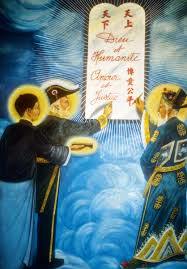The three Saints
The dominant feature of the Tinh Tam Dien is the mural on the wall. The three figures it depicts are Saints through their spiritualistic connection with Caodaism. In plain modern Chinese dress is the founder of the first Chinese Republic Sun Yat Sen (spiritual name: Trung Son Chon Nhon). He holds an inkstone representative of Chinese culture.
Next to him in Western dress and white beard is Victor Hugo the compassionate French poet and writer (who reveals himself spiritually as Chuong Dao Nguyet Tam Chon Nhon). He acts in the spiritual realm as the foreign missionary of Caodaism. He writes with a feather pen representing Western Civilisation.
Nguyen Binh Khiem (1492-1587), Victor Hugo (1802-1885), Sun-Yat-Sen (1866-1925),
signatories of the Third Alliance between God and Humankind.
God and Humanity
Dieu et Humanité
Tian Shang Tian Xia
Love and Justice - Amour et Justice - Bo Ai Gong Ping

The figure on the right is Trang Trinh Nguyen Binh Khiem (Thanh Son Dao Si) a highly respected Vietnamese poet and prophet of the 16th Century. He writes in Chinese characters the agreement between God and Humanity. This Agreement also appears in French. These two languages join Eastern and Western Civilisation with the same message. Translated into English these words are "God and Humanity" and "Love and Justice."
This is in essence the Third Alliance, goals that each us are expected to live up to. Holding to this agreement will lead to redemption. These Saints you see before you provide spiritual guidance to the faith and help Caodaists spread the message of the Third Alliance between God and Humanity.
The story of how this mural (at the Great Divine Temple, Tay Ninh Holy See) came to be is complex but interesting. Initially the Ho Phap instructed workers to build the frame, which is 1.9 metres wide and 2.8 metres high, but at the time he had no idea of what was to be painted in it. Le Minh Tong, the artist, was in gaol for political agitation. When he was released, the Spiritual Pope Ly Thai Bach / Li Tai Pe, directed the Ho Phap to this painter. Discussions between the Ho Phap and the painter gave the mural its present form.
On the 11 August 1948 the mural was taken with great ceremony to the Great Divine Temple. In a special ceremony the Ho Phap had to draw the spirits of these three saints into the painting. Not knowing which of the nine heavens these spirits might be residing in, the Ho Phap had to light nine incense sticks and moving from figure to figure directed their saintly energies into their respective representations.
Source: caodai.com.vn
